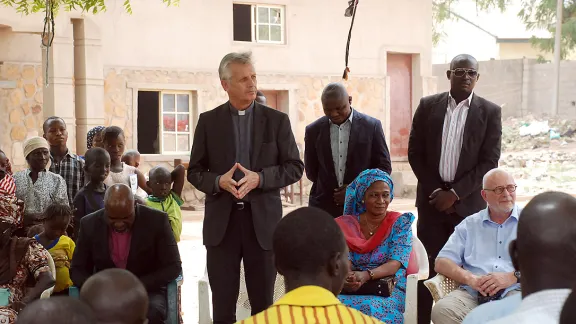
The LWF Council expressed appreciation to the General Secretary Rev. Dr Martin Junge for his solidarity visit to northern Nigeria in March this year. The LWF delegation included LCCN's Titi Malik (seated to Junge's left). Photo: Jfaden Multimedia
LWF Council resolution on Nigeria
GENEVA, 01 July 2015 (LWI) – A call by The Lutheran World Federation (LWF) Council on its churches to continue praying for peace and improved interfaith relations in Nigeria will contribute to national efforts to build trust in the aftermath of deadly attacks by the Boko Haram militant group, says the LWF Council member from Nigeria.
“It is important for Nigeria today because Boko Haram claims to have a religious foundation propelled by Islam,” said Titi Malik from the Lutheran Church of Christ in Nigeria (LCCN), commenting on the June 2015 LWF Council resolution on Nigeria.
In an interview, Malik, a member of the LWF Council’s Committee for Advocacy and Public Voice, said the Boko Haram attacks mainly targeting churches and Christians in northeastern Nigeria had brought tension in the society. “There is religious discrimination amongst people, fear, mistrust and mutual suspicion,” she said of the violence waged by the group since 2009, reportedly killing nearly 13,000 civilians, most of them in 2014 alone.
Malik noted that the violence has had an effect on harmonious co-existence among the people of different faiths in Nigeria. “The Lutheran church is now taking the issue of interfaith relations more seriously in order for peace and harmony to reign in Nigeria,” she emphasized.
The LWF Council also urged the Nigerian government to intensify efforts to bring back female students abducted in April 2014 by Boko Haram from a government secondary school in Chibok, in the northeastern state of Borno. It also commended the current government for relocating its command center for the fight against the militant group to Maiduguri, Borno’s capital. “The Chibok girls are yet to be found and some of them might have been taken away to other locations outside the borders of Nigeria,” Malik said.
Repatriation and reconstruction require concerted effort
While attacks by Boko Haram have reduced since the March 2015 election of Muhammadu Buhari as President, the reconstruction of homes, churches and properties, and proper repatriation of those displaced require concerted effort. “The families that were displaced by the violence get assistance - shelter, food, clothing, toiletries, medication and educational facilities, among others - from individuals, state and federal government, faith-based organizations etc,” Malik noted.
She is among several LCCN members who have been accommodating scores of displaced relatives and friends. She affirmed the church’s solidarity with its members: “The LCCN continues assisting those displaced by ensuring that they have shelter. The congregations contribute money and food items to help them survive. Vacancies have been opened in LCCN schools and other educational institutions for the displaced children to either continue with their studies, further their education or start schooling,” she added.
With relative calm returning, additional assistance is expected from the government in rehabilitating houses, farms, businesses and other basic facilities, and in boosting security by posting more soldiers and vigilante groups to the states devastated by the insurgency. “Many of the families are now going back home, and trying to settle down despite the losses,” Malik added.
Council 2015: more information
From Our Blog


